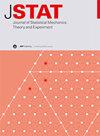市场影响的贝叶斯理论
IF 1.9
3区 物理与天体物理
Q2 MECHANICS
Journal of Statistical Mechanics: Theory and Experiment
Pub Date : 2024-08-28
DOI:10.1088/1742-5468/ad5271
引用次数: 0
摘要
金融市场上任何时候的可用流动性在很大程度上都无法满足机构投资者交易订单的典型规模。为了减少执行大订单对价格的影响,金融市场上的交易者会将大订单拆分成一系列小订单,然后按顺序执行。由此产生的交易序列称为元订单。实证研究揭示了元订单如何影响价格的一系列统计规律,其中包括:(i) 预期价格变化与总交易量的平方根行为;(ii) 小交易量时与线性机制的交叉;(iii) 序列交易结束后,平均价格向初始值回归。在这里,我们在一个最小的理论框架内恢复了这一现象,即市场通过以贝叶斯方式纳入有关元订单交易方向和速度的所有信息来确定价格。这一推导的简单性进一步证明了市场影响法则的稳健性和普遍性。特别是,它表明平方根影响法则源于对元订单产生的订单流的高估。本文章由计算机程序翻译,如有差异,请以英文原文为准。
A Bayesian theory of market impact
The available liquidity at any time in financial markets falls largely short of the typical size of the orders that institutional investors would trade. In order to reduce the impact on prices due to the execution of large orders, traders in financial markets split large orders into a series of smaller ones, which are executed sequentially. The resulting sequence of trades is called a meta-order. Empirical studies have revealed a non-trivial set of statistical laws on how meta-orders affect prices, which include (i) the square-root behaviour of the expected price variation with the total volume traded, (ii) its crossover to a linear regime for small volumes and (iii) a reversion of average prices towards its initial value, after the sequence of trades is over. Here we recover this phenomenology within a minimal theoretical framework where the market sets prices by incorporating all information on the direction and speed of trade of the meta-order in a Bayesian manner. The simplicity of this derivation lends further support to the robustness and universality of market impact laws. In particular, it suggests that the square-root impact law originates from over-estimation of order flows originating from meta-orders.
求助全文
通过发布文献求助,成功后即可免费获取论文全文。
去求助
来源期刊
CiteScore
4.50
自引率
12.50%
发文量
210
审稿时长
1.0 months
期刊介绍:
JSTAT is targeted to a broad community interested in different aspects of statistical physics, which are roughly defined by the fields represented in the conferences called ''Statistical Physics''. Submissions from experimentalists working on all the topics which have some ''connection to statistical physics are also strongly encouraged.
The journal covers different topics which correspond to the following keyword sections.
1. Quantum statistical physics, condensed matter, integrable systems
Scientific Directors: Eduardo Fradkin and Giuseppe Mussardo
2. Classical statistical mechanics, equilibrium and non-equilibrium
Scientific Directors: David Mukamel, Matteo Marsili and Giuseppe Mussardo
3. Disordered systems, classical and quantum
Scientific Directors: Eduardo Fradkin and Riccardo Zecchina
4. Interdisciplinary statistical mechanics
Scientific Directors: Matteo Marsili and Riccardo Zecchina
5. Biological modelling and information
Scientific Directors: Matteo Marsili, William Bialek and Riccardo Zecchina

 求助内容:
求助内容: 应助结果提醒方式:
应助结果提醒方式:


